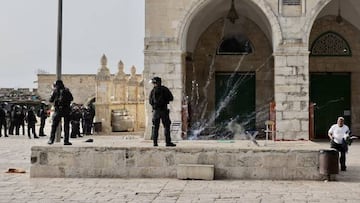How long has the Israel-Palestine conflict been going on?
Ever since the creation of Israel in 1947 there has been fighting in the region with multiple major wars in the last eighty years.


May 14, 2022, will mark the 74th anniversary of the day of Israeli independence from the British Empire. It marked the beginning of a new Jewish state in the Middle East, free from the great European nations and empires that had persecuted their kind for millenia, culminating in the horrifying holocaust in which 6 million Jews lost their lives, as well as millions of disabled, roma, gay, and plenty of other groups the Nazis deemed undesirable.
While a cause for celebration for Jews, the birth of Israel and its fallout is regarded by many Arabs in the Middle East as the Nakba or ‘catastrophe’ in English. While recognised internationally by the great powers of the day, the surrounding Arab nations would not accept the partition of Palestinian land between Arabs and Jews. So began the first Arab-Israeli war in 1948.
Seven decades of war
The Arab armies of Egypt, Syria, Jordan and Iraq were decisively defeated and Israel could consolidate the lands awarded by the UN by the occupation of 60 per cent of the Palestinian territories. The rest was divided between Jordan and Egypt.
Conflict raged again less than a decade later at the behest of the British and French as Israel went on the offensive in 1956, once again defeating the Egyptians and seizing Gaza. Another prospective Arab invasion in the Six-Day war of 1967 was thwarted by a pre-emptive Israeli attack, consolidating the large territorial gains they had made in a mere 20 years.
Israel’s final major war with outside powers was waged in 1973, the Yom Kippur war. This time, the Israeli army was on the defensive, but managed to negotiate a successful peace with Egypt that guaranteed security for the state.
While the Arab powers outside of Palestine were at arms length, Israel was facing greater dissent inside its borders. Palestinians, radicalised by years of pressure from Israel, carried out attacks against Israeli soldiers and government members, which has continued ever since. The group that is most closely associated with this is Hamas, a political party in the Palestinian Authority which frequently launches rocket attacks into Israel.
The most recent spate of large-scale violence was in 2021 in which 12 Israelis and more than 350 Palestinians were killed.
What could the outcome be of a peace settlement?
The closest to a lasting peace between Israelis and Palestinians occured with the signing of the Oslo Accords in 1993. Israel agreed to hand governance of Gaza and the West Bank to a Palestinian Authority. Further negotiations between the two groups were planned for the following years.
Related stories
However, Israeli negotiator at Oslo and Prime Minister Yitzhak Rabin was assassinated by hardline Israelis that did not wish a compromise with the Arabs. Since, prospect of a peace based upon a two-state solution, that being two independent states governed by each group, has drifted further apart.
Outside of a two-state solution, academics have argued that the only way both groups can move forward is a one-state solution, in which both groups like along side each other with equal rights. However, with successive governments in Israel railing against a Palestinian state with the 1967 agreed borders, it will be impossible for these same politicians to agree to what they would consider to be the destruction of Israeli identity by the incorporation of Arabs into the state.

